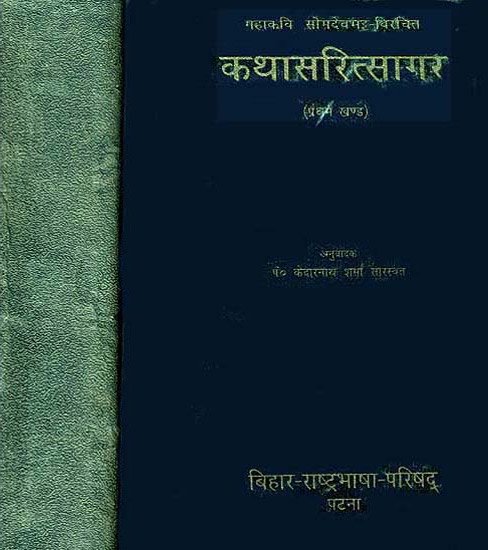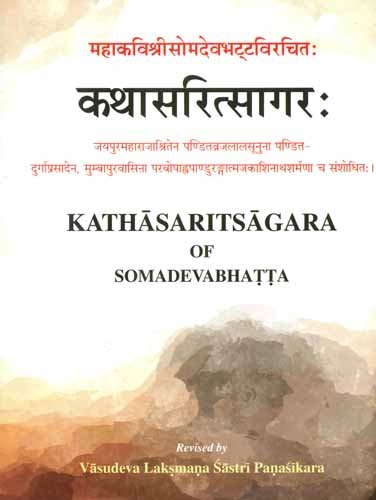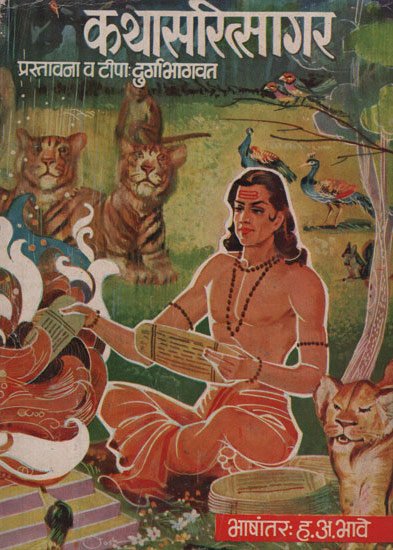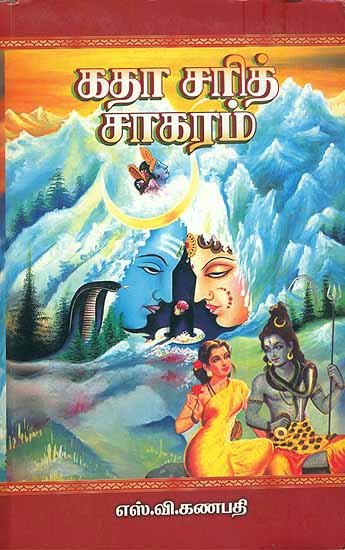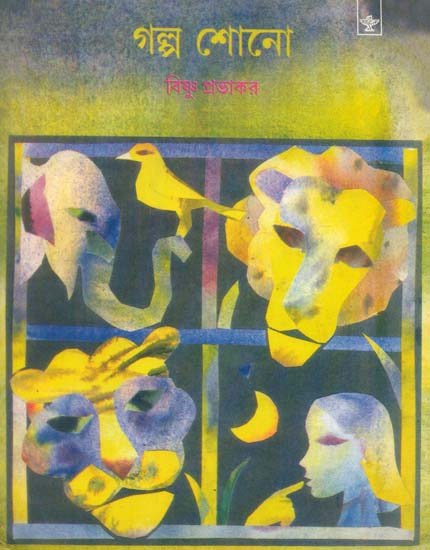Kathasaritsagara [sanskrit]
by C. H. Tawney | 2014 | 226,424 words | ISBN-13: 9789350501351
The Sanskrit edition of the Kathasaritsagara referencing the English translation and grammatical analysis. Written by Somadeva and dating from the 12th century, the Kathasaritsagara (or Katha-sarit-sagara) represents an epic legend narrating the adventures of Naravahanadatta as he strives to become the destined emperor of the Vidyadharas. Alternative titles: (Kathāsaritsāgara, कथासरित्सागर, Kathā-sarit-sāgara)
Verse 6.2.192
तत्क्षीराशनतो न किं पुनर् असौ भ्रष्टो ऽपि यातो दिवं संभूताश् च ततः प्रभृत्य् अविकला गावो न किं भूतले ।
तद् धन्यास्मि शुभोदयाद् उपनता दिव्या सखीयं मम प्रातश् चान्वयनामनी सुनिपुणं प्रक्ष्यामि ताम् आगताम् ॥ १९२ ॥
tatkṣīrāśanato na kiṃ punar asau bhraṣṭo 'pi yāto divaṃ saṃbhūtāś ca tataḥ prabhṛty avikalā gāvo na kiṃ bhūtale |
tad dhanyāsmi śubhodayād upanatā divyā sakhīyaṃ mama prātaś cānvayanāmanī sunipuṇaṃ prakṣyāmi tām āgatām || 192 ||
The English translation of Kathasaritsagara Verse 6.2.192 is contained in the book The Ocean of Story by C.H. Tawney. This book is available online or you could buy the latest edition:
Read online Buy now! The English translation by C.H. Tawney (2014)
Glossary of Sanskrit terms
Note: This extracts Sanskrit terms and links to English definitions from the glossary, based on an experimental segmentation of verse (6.2.192). Some terms could be superfluous while some might not be mentioned. Click on the word to show English definitions.
Tat, Tad, Kshira, Ashana, Tas, Kim, Punarasu, Bhrashta, Api, Yat, Yata, Yatri, Div, Diva, Sambhuta, Tatah, Tata, Avikala, Gava, Bhutala, Dhanya, Dhani, Shubhodaya, Upanata, Divi, Divya, Sakhi, Iyam, Idam, Asmad, Prata, Prat, Vayana, Amani, Agata,
Analysis of Sanskrit grammar
Note: this is an experimental feature and only shows the first possible analysis of the Sanskrit text (Kathasaritsagara Verse 6.2.192). If the system was successful in segmenting the sentence, you will see of which words it is made up of, generally consisting of Nouns, Pronouns, Verbs, Participles and Indeclinables. Click on the link to show all possible derivations of the word.
- Line 1: “tatkṣīrāśanato na kiṃ punar asau bhraṣṭo 'pi yāto divaṃ saṃbhūtāś ca tataḥ prabhṛty avikalā gāvo na kiṃ bhūtale ”
- tat -
-
tat (indeclinable correlative)[indeclinable correlative]tad (noun, neuter)[compound], [nominative single], [accusative single]
- kṣīrā -
-
kṣīra (noun, masculine)[compound], [vocative single]kṣīra (noun, neuter)[compound], [vocative single]kṣīrā (noun, feminine)[nominative single]
- aśana -
-
aśana (noun, masculine)[compound], [vocative single]aśana (noun, neuter)[compound], [vocative single]
- to* -
-
tas (noun, masculine)[compound], [vocative single]tas (noun, neuter)[compound], [nominative single], [vocative single], [accusative single]ta (noun, masculine)[nominative single]
- na -
-
na (indeclinable particle)[indeclinable particle]na (noun, masculine)[compound], [vocative single]na (noun, neuter)[compound], [vocative single]
- kim -
-
kim (indeclinable interrogative)[indeclinable interrogative]kim (indeclinable)[indeclinable]kim (pronoun, neuter)[nominative single], [accusative single]
- punarasau -
-
punarasu (noun, masculine)[locative single]punarasu (noun, feminine)[locative single]
- bhraṣṭo' -
-
bhraṣṭa (noun, masculine)[nominative single]
- api -
-
api (indeclinable preposition)[indeclinable preposition]ap (noun, neuter)[locative single]api (Preverb)[Preverb]
- yāto* -
-
yāt (noun, masculine)[accusative plural], [ablative single], [genitive single]yāt (noun, neuter)[ablative single], [genitive single]yāta (noun, masculine)[nominative single]√yā -> yāta (participle, masculine)[nominative single from √yā class 2 verb]yātṛ (noun, masculine)[vocative single]yātṛ (noun, feminine)[vocative single]√yā (verb class 2)[present active third dual]
- divam -
-
diva (noun, neuter)[adverb], [nominative single], [accusative single]divan (noun, masculine)[adverb]divā (noun, feminine)[adverb]div (noun, masculine)[accusative single]
- sambhūtāś -
-
sambhūta (noun, masculine)[nominative plural], [vocative plural]sambhūtā (noun, feminine)[nominative plural], [vocative plural], [accusative plural]
- ca -
-
ca (indeclinable conjunction)[indeclinable conjunction]ca (noun, masculine)[compound], [vocative single]ca (noun, neuter)[compound], [vocative single]
- tataḥ -
-
tataḥ (indeclinable adverb)[indeclinable adverb]tataḥ (indeclinable correlative)[indeclinable correlative]tataḥ (indeclinable)[indeclinable]tad (noun, neuter)[ablative single], [ablative dual], [ablative plural]tata (noun, masculine)[nominative single]√tan -> tata (participle, masculine)[nominative single from √tan class 8 verb]sa (noun, masculine)[ablative single], [ablative dual], [ablative plural]sā (noun, feminine)[ablative single], [ablative dual], [ablative plural]
- Cannot analyse prabhṛty*av
- avikalā* -
-
avikala (noun, masculine)[nominative plural], [vocative plural]avikalā (noun, feminine)[nominative plural], [vocative plural], [accusative plural]
- gāvo* -
-
go (noun, masculine)[nominative plural], [vocative plural]gāva (noun, masculine)[nominative single]√gā (verb class 2)[present active first dual]√gā (verb class 2)[present active first dual]
- na -
-
na (indeclinable particle)[indeclinable particle]na (noun, masculine)[compound], [vocative single]na (noun, neuter)[compound], [vocative single]
- kim -
-
kim (indeclinable interrogative)[indeclinable interrogative]kim (indeclinable)[indeclinable]kim (pronoun, neuter)[nominative single], [accusative single]
- bhūtale -
-
bhūtala (noun, neuter)[nominative dual], [vocative dual], [accusative dual], [locative single]
- Line 2: “tad dhanyāsmi śubhodayād upanatā divyā sakhīyaṃ mama prātaś cānvayanāmanī sunipuṇaṃ prakṣyāmi tām āgatām ”
- tad -
-
tad (indeclinable)[indeclinable]tad (indeclinable adverb)[indeclinable adverb]tat (indeclinable correlative)[indeclinable correlative]tad (noun, neuter)[compound], [nominative single], [accusative single]
- dhanyā -
-
dhanya (noun, masculine)[compound], [vocative single]dhanya (noun, neuter)[compound], [vocative single]√dhan -> dhanya (absolutive)[absolutive from √dhan]√dhan -> dhanya (absolutive)[absolutive from √dhan]dhanyā (noun, feminine)[nominative single]dhanī (noun, masculine)[nominative dual], [vocative dual], [accusative dual], [instrumental single]dhanī (noun, feminine)[instrumental single]
- asmi -
-
√as (verb class 2)[present active first single]
- śubhodayād -
-
śubhodaya (noun, masculine)[adverb], [ablative single]
- upanatā* -
-
upanata (noun, masculine)[nominative plural], [vocative plural]upanatā (noun, feminine)[nominative plural], [vocative plural], [accusative plural]
- divyā -
-
divī (noun, feminine)[instrumental single]divyā (noun, feminine)[nominative single]
- sakhī -
-
sakhi (noun, masculine)[adverb]sakhī (noun, feminine)[compound], [adverb], [nominative single], [vocative single]
- iyam -
-
iyam (noun, feminine)[nominative single]ī (noun, feminine)[accusative single]ī (noun, masculine)[accusative single]idam (pronoun, feminine)[nominative single]
- mama -
-
asmad (pronoun, none)[genitive single]√mā (verb class 2)[perfect active second plural]√mā (verb class 3)[perfect active second plural]√mā (verb class 4)[perfect active second plural]√mā (verb class 1)[perfect active second plural]
- prātaś -
-
prāta (noun, masculine)[nominative single]√prā -> prāt (participle, masculine)[accusative plural from √prā class 2 verb], [ablative single from √prā class 2 verb], [genitive single from √prā class 2 verb]√prā -> prāt (participle, neuter)[ablative single from √prā class 2 verb], [genitive single from √prā class 2 verb]√prā (verb class 2)[present active third dual]
- cān -
-
ca (noun, masculine)[accusative plural]
- vayanā -
-
vayana (noun, neuter)[compound], [vocative single]
- amanī -
-
amanī (noun, masculine)[compound]amanī (noun, feminine)[compound], [nominative single]amani (noun, feminine)[nominative dual], [vocative dual], [accusative dual]
- suni -
-
sū (noun, neuter)[locative single]
- pu -
-
pu (noun, masculine)[compound], [adverb]pu (noun, neuter)[compound], [adverb], [nominative single], [vocative single], [accusative single]pu (noun, feminine)[compound], [adverb]pū (noun, masculine)[adverb], [vocative single]pū (noun, neuter)[compound], [adverb], [nominative single], [vocative single], [accusative single]pū (noun, feminine)[adverb], [vocative single]
- ṇam -
-
ṇa (noun, masculine)[adverb], [accusative single]
- prakṣyāmi -
-
√praś (verb class 6)[future active first single]
- tām -
-
tā (noun, feminine)[accusative single]sā (noun, feminine)[accusative single]
- āgatām -
-
āgatā (noun, feminine)[accusative single]√ag (verb class 1)[imperfect active third dual]
Other editions:
Also see the following editions of the Sanskrit text or (alternative) English translations of the Kathasaritsagara Verse 6.2.192
Kathasaritsagar
by Kedarnath Sharma Saraswat (2005)
The Only Edition with the Sanskrit Text and its Hindi Translation (An Old and Rare Book) Set of 3 Vol.
Buy now!
Kathasaritsagara of Somadeva Bhatta (Sanskrit Text Only)
by Vasudeva Laksmana Sastri (2013)
Katha Sarit Sagar in Marathi
by H. A Bhave (1995)
Set of 5 Volumes; Published by Varada Books, Pune. 2256 pages (Throughout B/W Illustrations).
Buy now!
Katha Sarit Sagara (Tamil)
by S. V. Ganapati (எஸ். வி. கணபதி) (2014)
[கதா சரித் சாகரம்] Published by Alliance Publications.
Buy now!
Galpa Shono
by Abhijit Chattopadhyay (2014)
[গল্প শোনো] Galpa Shono: Bengali Translation of 'Suno Kahani From Katha Sarit Sagar'; 9788126015436; Published by Sahitya Akademi, Delhi.
Buy now!Preview of verse 6.2.192 in Bengali sript:
তত্ক্ষীরাশনতো ন কিং পুনর্ অসৌ ভ্রষ্টো ঽপি যাতো দিবং সংভূতাশ্ চ ততঃ প্রভৃত্য্ অবিকলা গাবো ন কিং ভূতলে ।
তদ্ ধন্যাস্মি শুভোদযাদ্ উপনতা দিব্যা সখীযং মম প্রাতশ্ চান্বযনামনী সুনিপুণং প্রক্ষ্যামি তাম্ আগতাম্ ॥ ১৯২ ॥
![Kathasaritsagara [sanskrit] - book cover](/uploads/a/Katha-Sarit-Sagara.jpg)
